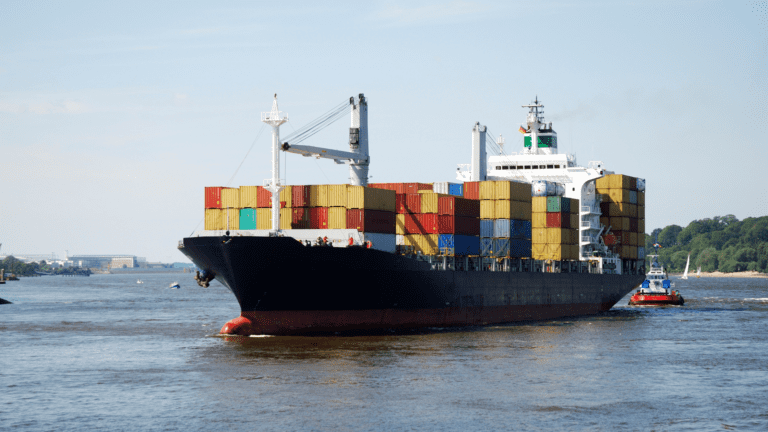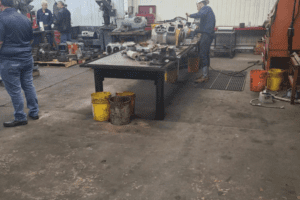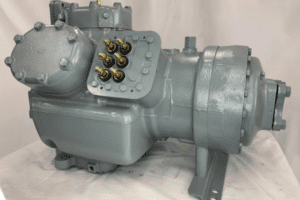

These containers provide a controlled environment for products such as poultry, beef, seafood, and dairy products that must be maintained at precise temperatures.
As the demand for shipping increases, reefer containers are becoming more sophisticated every year. Many of today’s reefers have advanced integrated monitoring sensors that alert shipboard personnel when the reefer falls out of expected performance tolerances for any reason.
Likewise, a higher proportion of today’s reefers include water cooling systems. Although pricey, these systems can help the container maintain performance under a wider range of conditions compared to the traditional air-cooled systems. These innovations reflect the reefer’s growing importance.
But one thing has remained the same: The compressor. Popular options for this applicaiton include the Carrier/Carlyle 5H60, 5H80 and 5H120.
And remanufactured reefer compressors remain the best option for your containers.
Remanufactured Compressors Prepare Shipping Enterprises for the Unexpected
Today’s reefers have enjoyed a number of engineering improvements to make them more efficient. They can stand up to substantial punishment and continue operating even when shipboard diesel systems can no longer provide power. But they still operate based on standard principles of refrigeration.
Individual systems may look a little bit different, but they are all here: The evaporator, the condenser, and of course, the compressor. As on land, the compressor is the “heart” of the refrigeration system and does a great deal of labor in the form of compressing cool, gaseous refrigerant into hot vapor.
The compressor is responsible for forcing the refrigerant through the system. It also consumes the most energy out of any component in the refrigeration system. With all this in mind, it’s not inaccurate to think of it as a kind of “engine”: When it fails, everything else in the system comes to a stop.
That leaves your reefer unable to work and your cargo perhaps minutes from spoilage.
The key to keeping your operation afloat – figuratively and literally – is remanufactured compressors.
Let’s review some of the top benefits of remanufactured compressors for the shipping industry:
1. Significantly Reduced Costs Compared to OEM Wholesaler Compressors
Every reefer requires its own compressor, and the cost quickly becomes substantial as you scale up the number of containers in service. A remanufactured compressor enables you to save an average of about 30% to 40% when you’re replacing the compressor units your reefers need.
Remember, “OEM” remanufacturers generally don’t come from the equipment manufacturer directly but from wholesalers associated with the brand. You are paying a premium for the brand name, but it does not justify the investment when a remanufactured compressor performs just as well.
2. Enhance the Longevity of Your Reefer Container System
A fully remanufactured compressor is disassembled, cleaned, and tested before it enters service, with key parts replaced to enhance longevity. The result is a “like new” machine you can expect to operate for as long as an OEM unit. All it requires is the regular maintenance you’d provide to any other compressor.
As compressors age, mechanical wear and tear can make them less efficient. This forces the other refrigeration components to work harder. A remanufactured compressor gives your reefer a new lease on life and protects you from the costly and disruptive consequences of a failed compressor.
3. Reduce Turnaround Time for Your New Compressor
Naturally, there’s a waiting period for any new compressor. However, a remanufactured compressor can be readied and delivered much more quickly than a new one. In general, you can expect a wait time of four to six weeks as compared to eight, twelve, or even more from the name brands.
This makes a substantial difference for companies that operate at or near their full capacity throughout most of the year. You can avoid weeks of lost opportunities by choosing a remanufactured compressor dealer in advance so your order can be serviced right away.
4. Maintain Business Continuity for Your Fleet
There’s never a good time for a compressor to fail – but the best scenario is the one you’re prepared for.
The combination of low costs, faster turnaround, and long service life has enabled many shipping firms to be proactive about their compressor needs. When a reefer unit fails or a regular inspection shows that performance is declining, they have multiple remanufactured compressors on-hand to make a quick replacement.
Whatever you choose, be aware of the critical role the compressor plays in meeting refrigeration requirements. Maintenance, strong vendor relationships, and advance planning keep a crisis from striking.












